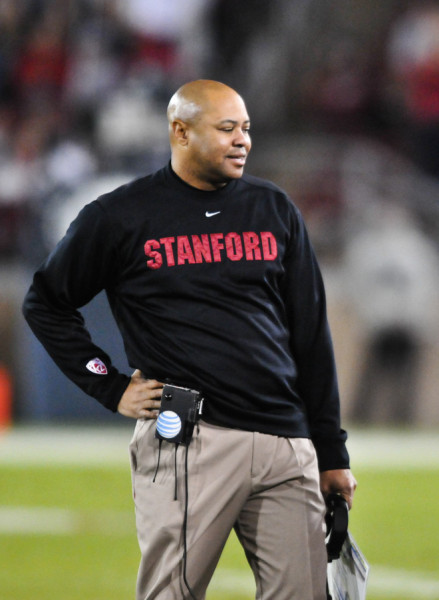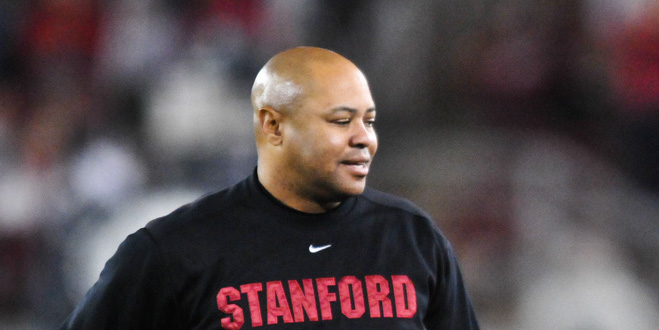One of the more polarizing issues gripping the college football world as of late is the length of conference schedules in power conferences across the country. Next season, the ACC and SEC will be sticking with an eight-game conference schedule while the other power conferences will be utilizing a presumably tougher nine-game conference schedule, bringing into question factors like parity and strength of schedule as the College Football Playoff looms. This decision has brought harsh criticism from many, most notably including Stanford’s David Shaw and Alabama’s Nick Saban. With that in mind, we asked football writers Vihan Lakshman, David Cohn and Michael Peterson what they thought about the debate and where they stood.

Vihan: The ACC and the SEC clearly get it: do as little as possible and still achieve your ultimate goals. Isn’t that what America is all about? If you’re the big bully on the playground, what incentive do you possibly have to go fight someone bigger? Just help yourself to a large dose of Savannah State and ride your reputation all the way to the Promised Land.
Sure, people will support nine-game conference schedules using lofty language like “better for the sport” and “more exciting matchups.” But that’s not the point. The point is to get to December with a zero in the loss column. In other words — to quote the patron saint of football, Al Davis — “Just win, baby.”
If the Pac-12 really wants to prove that it’s a premier conference and possibly even better than the big boys down South, it should schedule eight conference games — hell, seven conference games — to maximize the chance of going undefeated. With the College Football Playoff relying on a selection committee to choose teams as opposed to a computer formula, reputation, factors like money and the overall sexiness of a team will win out over “strength of schedule.”
A two-loss Stanford team that defeated Oregon, UCLA and the 1972 Miami Dolphins would not be chosen over an undefeated Alabama or Florida State or even a Notre Dame team in some proximity to the top 10, regardless of how many Cardinal supporters are on the committee. Sure, fewer power conference matchups will severely dilute the sport, deprive fans of many monumental matchups and make college football borderline unwatchable, but, sometimes, you gotta do what you gotta do.
David: Personally, I do not feel that an eight-game versus a nine-game conference schedule really changes the math in selecting the first “Final Four” for the 2015 College Football Playoff. Like in the BCS system, the playoff committee will heavily consider conference reputation in making its selections. Thus, until one of the other power conferences knocks the Southeastern Conference off its perch over an extended period of time, an SEC school will undoubtedly be featured in the playoff and most likely receive a top-two seed.
In turn, the ACC cannot really do anything to combat the notion that at least three conferences in the country (SEC, Pac-12, Big 12) are simply better football conferences from top to bottom. Florida State’s national championship win aside, over the 16-season BCS era, the ACC had an absolutely atrocious record in BCS bowl games at 5-13. That .278 winning percentage was by far the worst record of any conference in the period. Furthermore, three of those five wins came from FSU.
Secondly, it is rather hypocritical of Nick Saban to criticize his conference’s eight game conference schedule and then go out and schedule the likes of Southern Mississippi (1-11 in 2013, 0-12 in 2012), Florida Atlantic (6-6 in 2013, 3-9 in 2012) and Western Carolina (FCS school) this season. While Crimson Tide fans may point to their neutral site game in Atlanta against West Virginia as a significant test, we all know the crowd is going to be heavily in favor of the Tide. Furthermore, the Mountaineers were at the bottom of the Big 12 last year with a 4-8 overall record, and a 2-7 mark in conference play.
Again, I do not believe that the number of conference games will ultimately affect the selection of worthy teams, but I would simply ask that if a coach is going to bemoan his team’s eight-game conference slate, then that coach should back up his complaints with his scheduling.
Michael: In some ways, I agree with Vihan. If you can increase your odds of making it to the national championship game by playing much easier competition, then by all means do it.
But you can’t call yourself the top conference in the nation with only eight conference games when nearly everyone else challenges themselves with nine. One less conference game a year doesn’t sound like much at all — until you recognize that every few years, at least for the SEC, that means taking LSU or Alabama or Auburn or South Carolina or Texas A&M off your schedule. Can you imagine how Stanford would have fared if it played one less conference game in 2010 or 2011 and that game was against Oregon (yes, they’re in the same division, but for the sake of speculation, go along with it)? Or this season against USC? The Cardinal might have added another conference title in 2010 or 2011 and potentially even a national championship title to its collection.
The SEC every year continues to claim that it is the cream of the crop, yet it avoids challenging itself if at all possible. For the previous seven years before Florida State won the title this season, the SEC produced the best team in the country. But if you add in just one more conference game, who knows how long the streak would have lasted?
Naturally, every conference game can easily swing in either team’s favor — Utah should provide plenty of evidence for Cardinal fans. A rivalry or a quest for revenge can easily provide enough motivation to spark an underdog into a battle with a higher-ranked team.
It seems like Stanford is begging to play USC and Oregon each year to prove its worth against the highest caliber of opponents. Yet the best of the SEC dread facing each other. Want to call yourself the best conference in the nation? Prove it by willingly facing the best, and stop complaining about it.
Deep down inside, Vihan Lakshman, David Cohn and Michael Peterson are all more excited for Stanford’s August 30 matchup against UC-Davis than any other game on the team’s schedule this year and wish they could have just one more exciting non-conference matchup to look forward to. Suggest another fear-inducing non-conference opponent at vihan ‘at’ stanford.edu, dmcohn ‘at’ stanford.edu and mrpeters ‘at’ stanford.edu.
